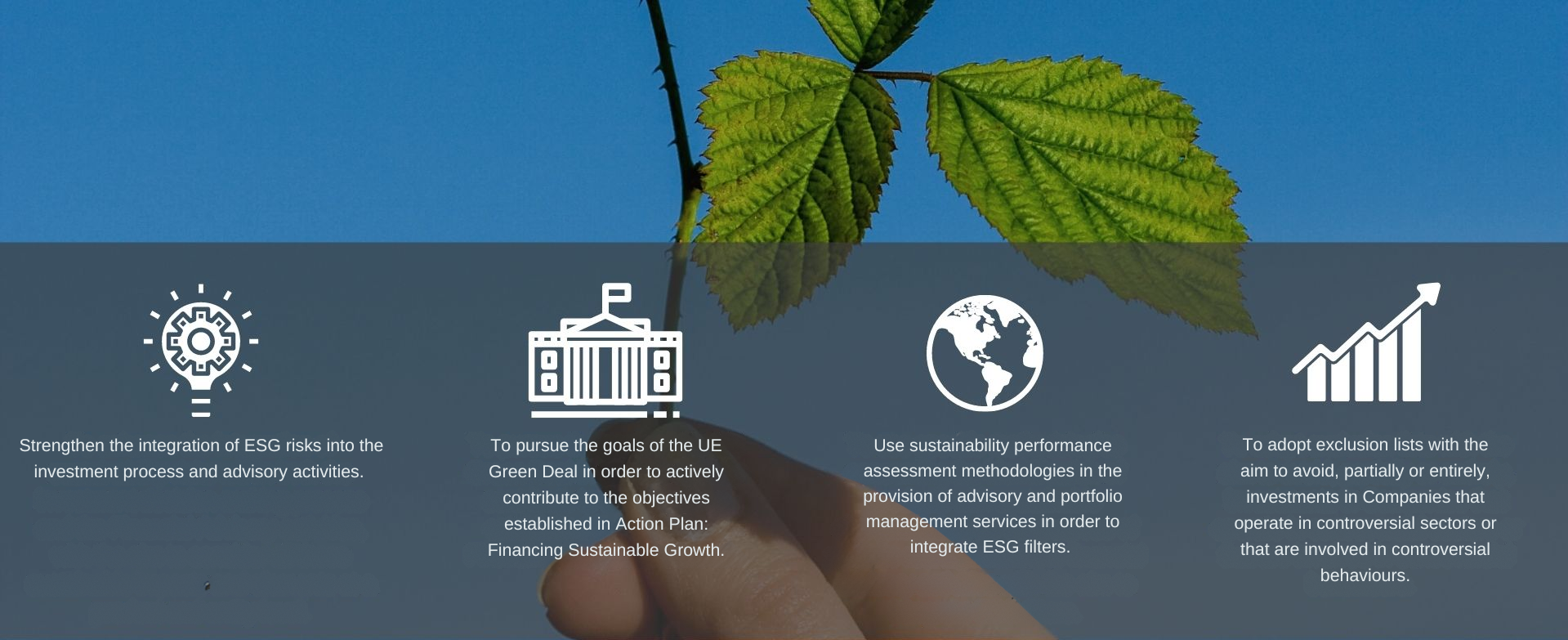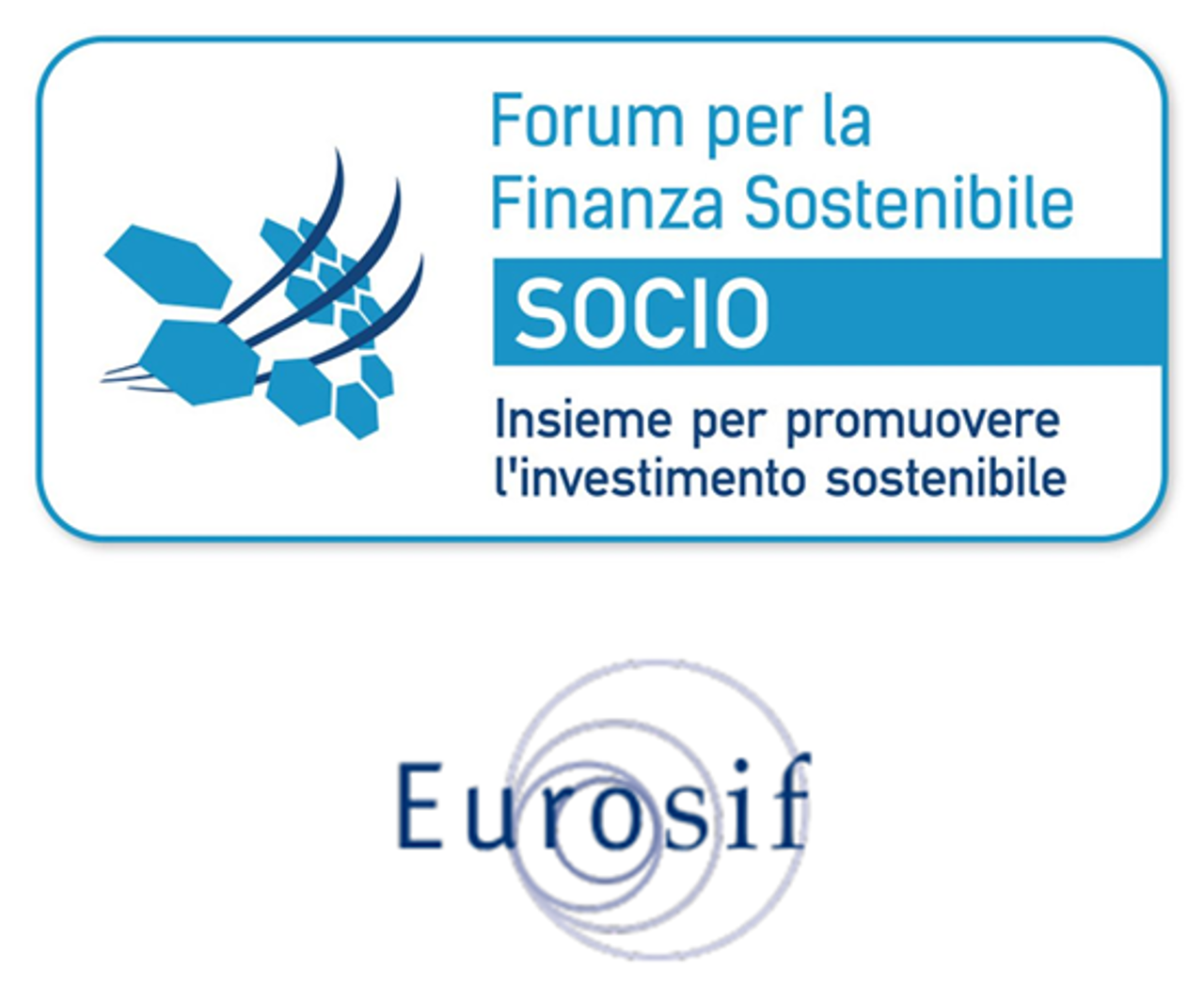
Responsible Investments
Among the different financial services, we also promote sustainability-oriented investments and support our clients in building portfolios that take their ESG (environmental, social and governance) preferences into account.
The three pillars of ESG
Environment, society and governance: these three pillars are the source of the acronym “ESG” (environmental, social and governance), which encompasses three different approaches to sustainability-oriented investments.
The first pillar — the environment — refers to themes relating to reducing pollution and rationalising waste. The second —the social — relates to gender policies, human rights, labour standards and relationships between productive enterprise and the community in which it operates. The third — governance — has to do with sound governance practices for companies and virtuous behaviour by businesses in the area of legal compliance and business ethics.
In pursuit of these goals, we promote sustainable investments and stand shoulder to shoulder with our customers in building ESG portfolios.

How the responsible investment process works
We have adopted procedures and methods that integrate the investment analysis conducted according to traditional financial criteria with an analysis focused on sustainability risks and potential negative impacts of investments on sustainability factors.
Our approach is based on negative screening and the consequent exclusion (so-called Restricted List) – total or partial – of exposures to companies operating in controversial sectors (e.g., tobacco, tar sands, adult entertainment, coal) or exhibiting controversial behavior (e.g., companies involved in serious and/or systematic violations of the United Nations Global Compact or the OECD Guidelines).
In addition, within our investment lines underlying the managed portfolios that promote environmental or social characteristics i.e., classified under Article 8 under EU Reg. 2019/2088, promote the aforementioned characteristics for the E, S and G pillars:
- Environmental: protecting the environment by controlling the direct and indirect effects driven by the economic activities of investments (e.g., use of renewable energy, GHG emissions and energy management, waste management and circular economy, water and soil management, biodiversity), also along the supply chain;
- Social: respect for human rights, occupational health and safety, and human capital development; fostering social cohesion and integration, also along the supply chain;
- Governance: supporting effective governance actions that aim to ensure the pursuit of appropriate ESG strategies and appropriate tax and ethical compliance.
In order to pursue these characteristics we select financial instruments through the use of the ESG score, a sustainability indicator used to measure sustainability performance on a scale of 1 (low rating) to 5 (very high rating). This score – provided by a leading information provider – represents the extent to which an entity manages its exposure to ESG risks that could impact its financial performance. Consequently, a lower ESG score indicates a higher likelihood of encountering ESG-related controversies, which in turn may lead to a decrease in the value of financial instruments.
The ESG score is determined by comparing the ESG performances of an issuer with those of issuers in the same industry. In the case of mutual funds and SICAV, we also take into account the institutional commitment and strategy pursued by the operator in considering sustainability in investment decisions. With regard to instruments issued by government issuers, the assessment takes into account not only the Environmental, Social, and Governance (ESG) dimensions, but also an evaluation related to the macroeconomic context.
At least 75% of the value of portfolio - excluding cash - is invested in underlying assets with a ESG score of at least 3; in addition, underlying assets with a score below 2.5 are excluded. The portfolio's overall ESG score is at least equal to 3. In addition, we integrate this methodology with the identification of relevant ESG controversies, which allows us to identify the reason for the violation, the causes that grave rise to it and the measures taken to face and tackle the problem.
Regulation (EU) No. 2019/2088 has introduced disclosure obligations on the integration of sustainability risks and the consideration of adverse sustainability impacts in investment processes: for further information, visit the page with Banca Generali's information on sustainability in the financial services sector.
Investments in support of SDGs: measuring the positive contribution
We believe that private investors may also play an active part in implementing the international sustainable development agenda by financing, through their investment choices, companies committed, for example, to reducing greenhouse gas emissions and more efficient use of resources, offering high-quality care services or products for healthy nutrition, as well as companies capable of creating an inclusive workplace oriented towards the wellbeing of their employees.
In collaboration with MainStreet Partners, we have thus developed a proprietary platform capable of providing an in-depth analysis of the level of sustainability of individual investment products, and of calculating the degree of alignment to the individual Sustainable Development Goals (SDGs) promoted by the United Nations, determining its positive contribution in tangible terms through the use of appropriate metrics. These measurements related to the SDGs and the positive contribution of the investment, such as pollution reduction, water saved, support for local communities, or gender equality, are available for a selected perimeter of the products belonging to the investible universe
Partnerships to promote responsible investment

Italian Sustainable Investment Forum
We have been ordinary members of the Forum for Sustainable Finance (SBB) since May 2019. Born in 2001, the Forum for Sustainable Finance is a multi-stakeholder non-profit association: it includes financial operators and other organizations interested in environmental impact and social investment.
Eurosif
The Association promotes the knowledge and practice of sustainable investment, with the aim of spreading the integration of environmental, social and governance criteria into financial products and processes.
The Forum is a member of Eurosif, an association committed to promoting sustainable finance in European markets.
Principles for Responsible Investments
As Banca Generali Group we adhered at the end of 2022 to the Principles for Responsible Investments (PRI), promoted by the United Nations, confirming our commitment made in the Strategic Plan 2022-2024, in line with our Vision, to aim to be the first Private Bank in terms of Value of service, Innovation and sustainability.
